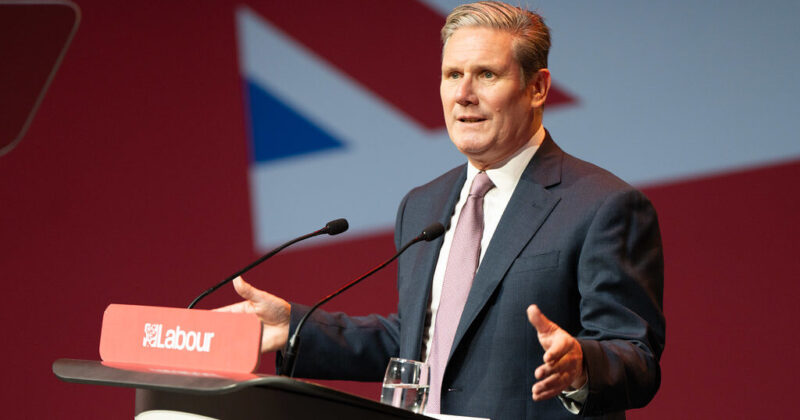

By KD Tait
KEIR STARMER spent his first conference as prime minister under pressure to offer tangible evidence of the party’s commitment to its election slogan of ‘change’.
Rachel Reeves responded to demands for the government to set out a positive vision by putting on a grin and declaring there would be ‘no return to austerity’ while doubling down on her commitment to maintaining ‘iron fiscal discipline’.
Resurrecting Theresa May’s plan to means-test winter fuel payments and maintaining the Tories’ vindictive two-child benefit cap are a strange way for the Chancellor to distance her government from what she called the ‘destructive choice’ of Conservative austerity.
Demonstrating fiscal responsibility by dishing out a punishment beating to the young and the old didn’t satisfy business, who complained the Chancellor’s downbeat tone was threatening to ‘talk Britain into a recession’.
But for the trade unions and the Labour left, the measures sent a clear message about who is going to be at the front of the queue for the ‘tough choices’ made on their behalf by Labour ministers.
A motion put down by Unite and backed by the CWU and others demanded Labour reverse the winter fuel allowance cut, scrap the fiscal rules, and impose a tax on wealth and excess profits.
Despite party bureaucrats fixing the agenda to postpone the debate until after the leaders were safely out of town, the vote was carried decisively by the trade union delegates.
In common with all his predecessors, Starmer had declared that he would take no notice of the non-binding motions passed by conference. Nevertheless, the vote represents an unprecedented rebuke to a new Labour government.
In a conference long on ministerial speeches and short on policy announcements, there were plenty of indications of this government’s attitude to the interests of the ‘working people’ it claims to represent.
Starmer’s speech urged people to join the ‘shared struggle’ of ‘tough decisions’. This echo of George Orborne’s claim that ‘we’re all in this together’ when austerity was first introduced was no accident.
Labour remains committed to the neoliberal policy of shrinking the welfare state and opening public services to exploitation by private profiteers. That’s what lies behind Starmer’s announcement of a crackdown on benefit fraud and Wes Streeting’s plan to hand over patient records to big data firms.
Protesters from Climate Resistance who heckled Rachel Reeves demanding an end to arms sales to Israel were manhandled out of the hall by the ubiquitous security goons. On the Saturday 15,000 had demonstrated outside the conference demanding an end to arms sales to Israel. Inside the words ‘genocide’ and ‘apartheid’ were expunged from all official conference literature.
This year’s conference should have been a victory lap for the leader of the first Labour government since 2010. But the honeymoons traditionally enjoyed by new governments are a thing of the past in a country battered by 14 years of austerity.
Labour tried to exploit this deep anger and disaffection during the election, but in the end it won fewer votes than in 2019. Trade unions and members willing to give Starmer the benefit of the doubt can be left in no doubt about the priorities of this government.
The RCN’s announcement, in the middle of Reeves’ speech, that nurses had overwhelmingly rejected the government’s derisory 5.5 per cent pay offer, was a clear indication that Labour won’t be able to buy its policy of class peace partnership between unions, government and business won’t be bought cheaply.
The left in Labour has disappeared, leaving opposition to the unions. Unite, CWU and FBU took a combative approach on the conference floor, and PCS and NEU leaders delivered militant speeches at conference fringe meetings — but now this has to be backed up with action.
The TUC has called a day of action on 10 October to demand Labour end its support for Israel’s genocidal war in Gaza. The best way to put pressure on Starmer is to organise political action in the workplace: mass meetings and walkouts should be organised wherever possible.
Budget day on 30 October should be the focus for a major day of action demanding no return to austerity — make the rich pay.
What is needed is mobilisation of the rank and file across the trade unions to organise a united front of resistance to Labour austerity, mobilise a political campaign to defend the NHS, and fight for real restoration of pay, financed by taxing the rich.